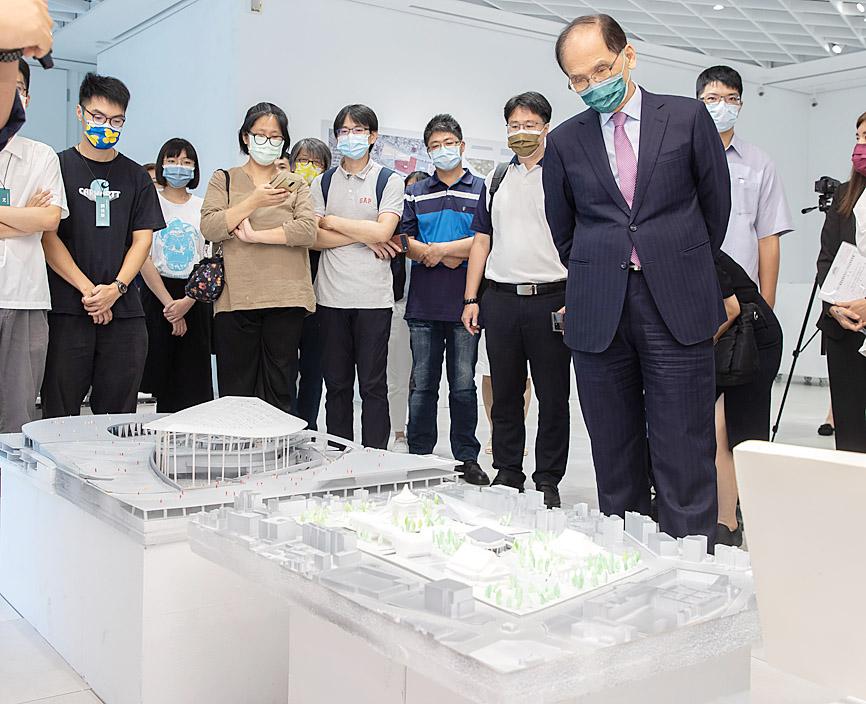A new site for the Legislative Yuan is still being sought, with a location that symbolizes sovereignty and Taiwanese identity being a priority, Legislative Speaker You Si-kun (游錫堃) said yesterday at an exhibit of possible designs for the new grounds.
The exhibition took place at the National Taipei Univeristy of Technology and was hosted by the Chinese Institute of Urban Design.
It featured designs from the architecture departments of Chinese Culture University, Chung Yuan Christian University, Tunghai University, Shih Chien University, National Cheng Kung University, National Taipei University of Technology and National University of Kaohsiung.

Photo: CNA
You thanked all the graduate students who participated in creating the designs, and said their work would serve as reference concepts for when a location is chosen.
Legislative buildings in democratic countries often become symbols of their sovereign identity, You said, citing the British principle of “omnipotence of parliament” and the swearing in of US presidents in front of Congress on Capitol Hill in Washington.
As Taiwan grows on the international stage, an increasing number of dignitaries are expected to visit the Legislative Yuan, which is deteriorating and unable to be expanded given its status as a historical site, You said, adding that Taiwan is considered by the Economist Intelligence Unit and the Freedom House Democracy Index to be among the world’s leading democracies.
Providing a new home for the Legislative Yuan is an effort that all Taiwanese should support and help work toward, he said.
However, a hasty decision on the location would not be made if one cannot be found during his term, he said.

SHIPS, TRAINS AND AUTOMOBILES: The ministry has announced changes to varied transportation industries taking effect soon, with a number of effects for passengers Beginning next month, the post office is canceling signature upon delivery and written inquiry services for international registered small packets in accordance with the new policy of the Universal Postal Union, the Ministry of Transportation and Communications said yesterday. The new policy does not apply to packets that are to be delivered to China, the ministry said. Senders of international registered small packets would receive a NT$10 rebate on postage if the packets are sent from Jan. 1 to March 31, it added. The ministry said that three other policies are also scheduled to take effect next month. International cruise ship operators

NUMBERS IMBALANCE: More than 4 million Taiwanese have visited China this year, while only about half a million Chinese have visited here Beijing has yet to respond to Taiwan’s requests for negotiation over matters related to the recovery of cross-strait tourism, the Tourism Administration said yesterday. Taiwan’s tourism authority issued the statement after Chinese-language daily the China Times reported yesterday that the government’s policy of banning group tours to China does not stop Taiwanese from visiting the country. As of October, more than 4.2 million had traveled to China this year, exceeding last year. Beijing estimated the number of Taiwanese tourists in China could reach 4.5 million this year. By contrast, only 500,000 Chinese tourists are expected in Taiwan, the report said. The report

The Forestry and Nature Conservation Agency yesterday launched a gift box to market honey “certified by a Formosan black bear” in appreciation of a beekeeper’s amicable interaction with a honey-thieving bear. Beekeeper Chih Ming-chen (池明鎮) in January inspected his bee farm in Hualien County’s Jhuosi Township (卓溪) and found that more than 20 beehives had been destroyed and many hives were eaten, with bear droppings and paw prints near the destroyed hives, the agency said. Chih returned to the farm to move the remaining beehives away that evening when he encountered a Formosan black bear only 20m away, the agency said. The bear

HORROR STORIES: One victim recounted not realizing they had been stabbed and seeing people bleeding, while another recalled breaking down in tears after fleeing A man on Friday died after he tried to fight the knife-wielding suspect who went on a stabbing spree near two of Taipei’s busiest metro stations, Taipei Mayor Chiang Wan-an (蔣萬安) said. The 57-year-old man, identified by his family name, Yu (余), encountered the suspect at Exit M7 of Taipei Main Station and immediately tried to stop him, but was fatally wounded and later died, Chiang said, calling the incident “heartbreaking.” Yu’s family would receive at least NT$5 million (US$158,584) in compensation through the Taipei Rapid Transit Corp’s (TRTC) insurance coverage, he said after convening an emergency security response meeting yesterday morning. National